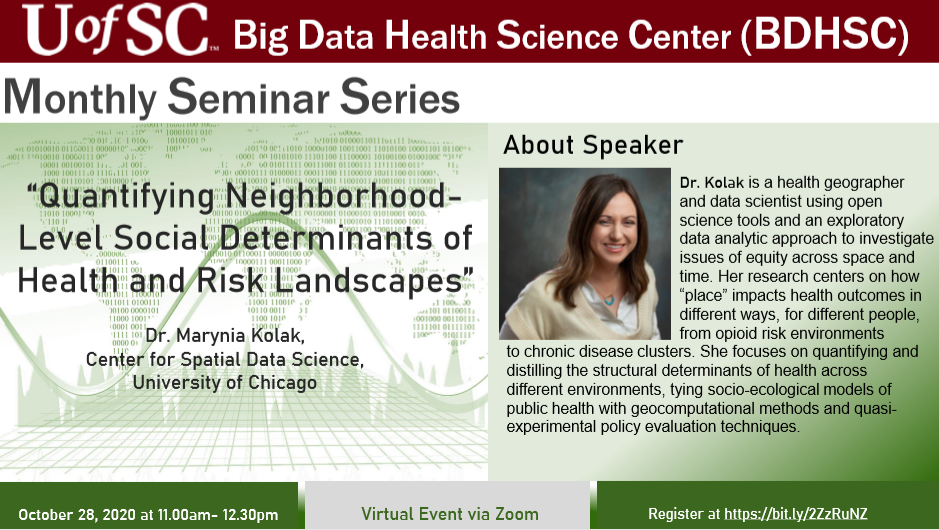
- This event has passed.
Quantifying Neighborhood-Level Social Determinants of Health and Risk Landscapes Seminar
About the Event:
Associations between social and neighborhood characteristics and health outcomes are well known but remain poorly understood owing to complex, multidimensional factors that vary across geographic space. Growing interest in quantifying social determinants of health (SDOH) at a small-area resolution must account for such complexity. In a recent cross-sectional study, a Kolak-led team developed multidimensional SDOH indices and a regional typology of the continental U.S. at a small-area level using dimension reduction and clustering machine learning techniques, spatializing results at each stage. Four SDOH indices accounted for 71% of the variance across all census tracts. The neighborhood typology of extreme poverty, which is of greatest concern to health care practitioners and policy advocates, comprised only 9.6% of all tracts characterized small areas of known public health crises. An association was observed between all SDOH indices and age-adjusted premature mortality rates in Chicago, even after accounting for violent crime and spatial structures.
The modeling of SDOH as multivariate, geographic phenomena may better capture the complexity and spatial heterogeneity underlying SDOH and associated disparities in health outcomes. Extensions of this work may also characterize and define risk landscapes in complex environments, from the opioid epidemic to COVID-19 pandemic. For example, the US Covid Atlas Project integrates regional contextual factors within a dynamic hotspot surveillance application. During a time of increased attention to SDOH, a spatially explicit approach may provide actionable information for key stakeholders with respect to the focus of interventions — and better understand what constitutes, drives, and sustains resilient communities.
Details:
This event is free and will take place via Zoom. You may use the following link to register,
https://us02web.zoom.us/webinar/register/WN_D7977Zh9RPaRM8UO5E48LA

About the Speaker:
Marynia Kolak, MS, MFA, PhD, is a health geographer and data scientist using open science tools and an exploratory data analytic approach to investigate issues of equity across space and time. Her research centers on how “place” impacts health outcomes in different ways, for different people, from opioid risk environments to chronic disease clusters. She focuses on quantifying and distilling the structural determinants of health across different environments, tying socio-ecological models of public health with geocomputational methods and quasi-experimental policy evaluation techniques.
She received the 2017 Concordium Innovation Award at AcademyHealth for her open-source visualization of Chicago neighborhood health indicators, and “Highest Impact” award in the Prevention Category at the American College of Cardiology 2019 conference for her work in connecting chronic disease rates with social determinants of health. She serves as the lead PI for the US Covid Atlas Project in part funded by the Robert Wood Johnson Foundation, PI for two air quality “smart city” projects with the Chicago Department of Public Health, Co-I for an NIH project investigating the opioid epidemic in rural Illinois, and is the spatial analytic lead at the Methodology and Advanced Analytics Resource Center for the Justice Community Opioid Innovation Network (NIH HEAL Initiative).
Marynia is the Assistant Director of Health Informatics and Senior Lecturer in GIScience at the Center for Spatial Data Science, University of Chicago. She additionally serves as a Health and Medical Specialty Group (AAG) board member and is chair of the Chicago Public Health GIS Network. She received her Ph.D in Geography at Arizona State University, M.F.A in Writing from Roosevelt University, M.S. in GIS from John Hopkins University, and B.S. in Geology from the University of Illinois at Urbana-Champaign.
